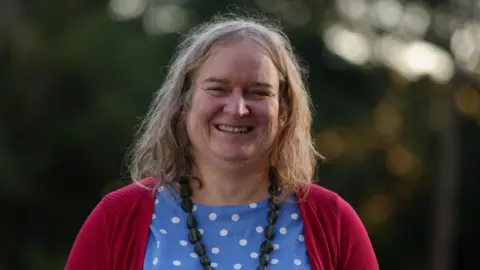A transgender woman from Australia has won a discrimination case against a women-only social media app, after she was denied access on the basis of being male.
The Federal Court found that although Roxanne Tickle had not been directly discriminated against, she was a victim of indirect discrimination – which refers to when a decision disadvantages a person with a particular attribute – and ordered the app to pay her A$10,000 ($6,700; £5,100) plus costs.
It’s a landmark ruling when it comes to gender identity, and at the very heart of the case was the ever more contentious question: what is a woman?
In 2021, Tickle downloaded “Giggle for Girls”, an app marketed as an online refuge where women could share their experiences in a safe space, and where men were not allowed.
In order to gain access, she had to upload a selfie to prove she was a woman, which was assessed by gender recognition software designed to screen out men.
However, seven months later – after successfully joining the platform – her membership was revoked.
As someone who identifies as a woman, Tickle claimed she was legally entitled to use services meant for women, and that she was discriminated against based on her gender identity.
She sued the social media platform, as well as its CEO Sall Grover, and sought damages amounting to A$200,000, claiming that “persistent misgendering” by Grover had prompted “constant anxiety and occasional suicidal thoughts”.
“Grover’s public statements about me and this case have been distressing, demoralising, embarrassing, draining and hurtful. This has led to individuals posting hateful comments towards me online and indirectly inciting others to do the same,” Tickle said in an affidavit.
Giggle’s legal team argued throughout the case that sex is a biological concept.
They freely concede that Tickle was discriminated against – but on the grounds of sex, rather than gender identity. Refusing to allow Tickle to use the app constituted lawful sex discrimination, they say. The app is designed to exclude men, and because its founder perceives Tickle to be male – she argues that denying her access to the app was lawful.
But Justice Robert Bromwich said in his decision on Friday that case law has consistently found sex is “changeable and not necessarily binary”, ultimately dismissing Giggle’s argument.
Tickle said the ruling “shows that all women are protected from discrimination” and that she hoped the case would be “healing for trans and gender diverse people”.
“Unfortunately, we got the judgement we anticipated. The fight for women’s rights continues,” Grover wrote on X, responding to the decision.
Known as “Tickle vs Giggle”, the case is the first time alleged gender identity discrimination has been heard by the federal court in Australia.
It encapsulates how one of the most acrimonious ideological debates – trans inclusion versus sex-based rights – can play out in court.
 Grata Fund
Grata Fund‘Everybody has treated me as a woman’
Tickle was born male, but changed her gender and has been living as a woman since 2017.
When giving evidence to the court, she said: “Up until this instance, everybody has treated me as a woman.”
“I do from time to time get frowns and stares and questioning looks which is quite disconcerting…but they’ll let me go about my business.”
But Grover believes no human being has or can change sex – which is the pillar of gender-critical ideology.
When Tickle’s lawyer Georgina Costello KC cross examined Grover, she said:
“Even where a person who was assigned male at birth transitions to a woman by having surgery, hormones, gets rid of facial hair, undergoes facial reconstruction, grows their hair long, wears make up, wears female clothes, describes themselves as a woman, introduces themselves as a woman, uses female changing rooms, changes their birth certificate – you don’t accept that is a woman?”
“No”, Grover replied.
She also said she would refuse to address Tickle as “Ms,” and that “Tickle is a biological male.”
Grover is a self-declared ‘TERF’ – an acronym that stands for “trans-exclusionary radical feminist.” TERFs’ views on gender identity are widely considered to be hostile to trans people.
“I’m being taken to federal court by a man who claims to be a woman because he wants to use a woman-only space I created,” she posted on X.
“There isn’t a woman in the world who’d have to take me to court to use this woman only space. It takes a man for this case to exist.”
She says she created her app “Giggle for Girls” in 2020 after receiving a lot of social media abuse by men while she worked in Hollywood as a screenwriter.
“I wanted to create a safe, women-only space in the palm of your hand,” she said.
“It is a legal fiction that Tickle is a woman. His birth certificate has been altered from male to female, but he is a biological man, and always will be.”
“We are taking a stand for the safety of all women’s only spaces, but also for basic reality and truth, which the law should reflect.”
Grover has previously said that she would appeal the court’s decision and will fight the case all the way to the High Court of Australia.
A legal precedent
The outcome of this case could set a legal precedent for the resolution of conflicts between gender identity rights and sex-based rights in other countries.
Crucial to understanding this is the Convention on the Elimination of Discrimination Against Women (CEDAW). This is an international treaty adopted in 1979 by the UN – effectively an international bill of rights for women.
Giggle’s defence argued that Australia’s ratification of CEDAW obliges the State to protect women’s rights, including single-sex spaces.
So today’s ruling in favour of Tickle will be significant for all the 189 countries where CEDAW has been ratified – from Brazil to India to South Africa.
When it comes to interpreting international treaties, national courts often look at how other countries have done it.
Australia’s interpretation of the law in a case that got this level of media attention is likely to have global repercussions.
If over time a growing number of courts rule in favour of gender identity claims – it is more likely that other countries will follow suit. -BBC News



